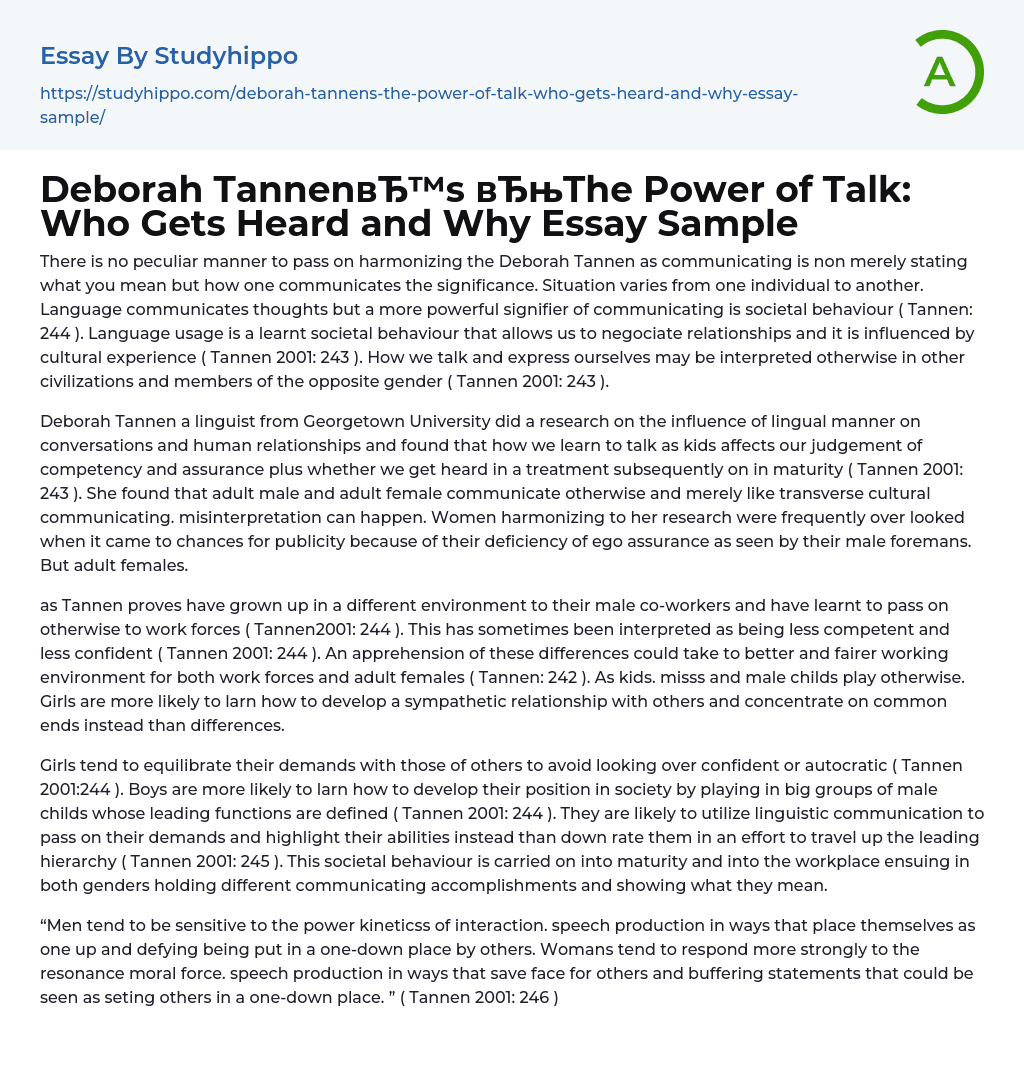

Deborah Tannen’s “The Power of Talk: Who Gets Heard and Why Essay Sample
According to Deborah Tannen, communication is not solely about conveying meaning; it also encompasses the manner in which it is accomplished. People have different ways of communicating, and language serves as a tool for expressing thoughts. However, social behavior holds even greater significance as a means of communication (Tannen: 244). Language is a learned social behavior that enables us to navigate relationships and is influenced by cultural experiences (Tannen 2001: 243). The way we speak and express ourselves may be interpreted differently in other cultures or by individuals of the opposite gender (Tannen 2001: 243).
Deborah Tannen, a linguist from Georgetown University, conducted a study on the impact of language style on conversations and human relationships. According to her findings (Tannen 2001:243), our early language acquisition influences how we view competence, confidence, and our ability to be heard in adulthood. Tannen also observed that adult men an
...d women communicate differently, similar to cross-cultural communication, leading to potential misunderstandings. Her research suggests that male supervisors often perceive women as lacking self-assurance, resulting in missed opportunities for promotion. However, Tannen argues that women possess unique communication skills due to their distinct upbringing (Tannen 2001:244).
Tannen (2001: 244) suggests that perceiving these differences in communication style can lead to a perception of lower competence and confidence. By understanding these disparities, we can create a better work environment for both genders (Tannen: 242). Additionally, when it comes to children, boys and girls have different play preferences. Girls often prioritize building connections and focusing on common goals rather than highlighting differences.
According to Tannen (2001:244), girls tend to balance their demands with others' to avoid appearing too confident or authoritative. On the othe
hand, boys learn to establish their position in society by playing in large groups of boys with defined leadership roles (Tannen 2001:244). They use language to communicate their needs and highlight their abilities, rather than downplaying them to climb the hierarchy (Tannen 2001:245). This social behavior persists into adulthood and the workplace, resulting in genders having different communication skills and expressing their intentions differently. Men are sensitive to the power dynamics of interaction, speaking in ways that position themselves as superior and resisting being placed in an inferior position by others.
According to Tannen (2001:246), women are inclined to respond more emphatically to the moral force of resonance through their speech, using strategies that protect the dignity of others and minimize statements that might be seen as putting others at a disadvantage. In contrast, men are more prone to praise their own abilities by showcasing their achievements (Tannen 2001:246).
Different cultures have distinct communication rituals that involve various types of responses. When it comes to gender differences, women tend to apologize more frequently as a way to demonstrate concern and may also use softer criticism in order to preserve the other person's dignity (Tannen 2001: 250). Additionally, women engage in compliment exchanges by assuming a modest stance and expecting the other person to grasp the ritual and respond accordingly (Tannen 2001: 251). Conversely, men possess their own unique communication styles.
Apologies should be avoided as they put the speaker in a subordinate position. Those who were raised to assert dominance by demeaning others and asserting their own superiority are unlikely to respond positively when a woman engages in a compliment exchange by placing herself in a subordinate role.
Instead, they are more likely to further belittle her and offer advice or criticism. This behavior can disadvantage women at work and lead to them being seen as lacking confidence (Tannen 2001: 251).
It is crucial for individuals in leadership positions to understand the different communication styles of both men and women in order to optimize the use of talented employees. There is no one correct way to communicate since it depends on the situation, culture, and language of the individuals (Tannen 2001: 257).
Bibliography
- Tannen. D.2001 ” The Power of Talk: Who Gets Heard and Why”. From Linguistics at Work: A Reader of Applications, edited by Dallin D. Oaks 242-259.
- Social Construction of Gender essays
- Culture essays
- Social Control essays
- Citizenship essays
- Social Justice essays
- Caste System essays
- Social Responsibility essays
- Socialization essays
- Deviance essays
- Modern Society essays
- Popularity essays
- Civil Society essays
- Community essays
- Female essays
- Filipino People essays
- Igbo People essays
- Indigenous Australians essays
- Indigenous Peoples essays
- Minority Group essays
- Social Institution essays
- Men essays
- The nation essays
- Middle Class essays
- Social Norms essays
- Discourse Community essays
- Popular Culture essays
- Car Culture essays
- American Culture essays
- Mormon essays
- Indian Culture essays
- Mexican Culture essays
- Pop Culture essays
- Cultural Differences essays
- Culture Shock essays
- Different Cultures essays
- Boy essays
- Gay essays
- Gender essays
- Gender Identity essays
- Gender Roles In Society essays
- Gender Stereotypes essays
- Girl essays
- Homosexuality essays
- Human Sexual Behavior essays
- Lgbt essays
- Man essays
- Masculinity essays
- Sexual Orientation essays
- Transgender essays
- Woman essays



